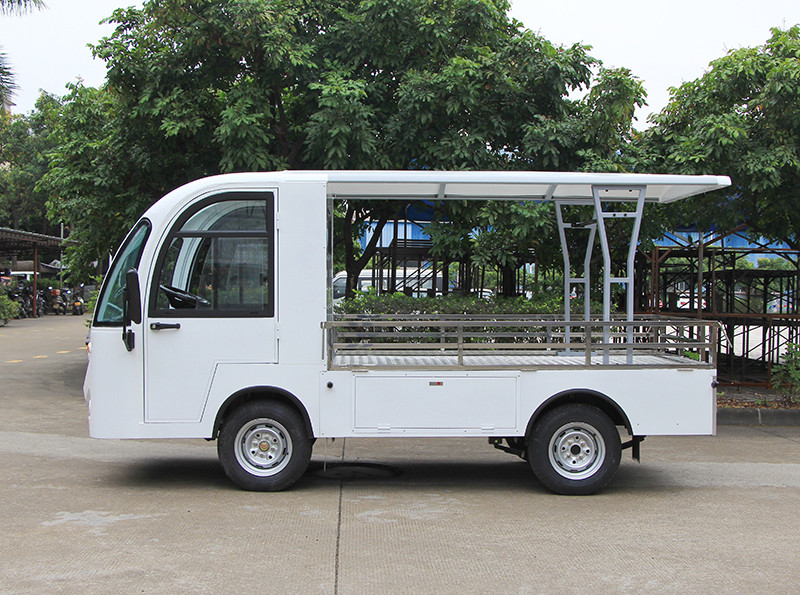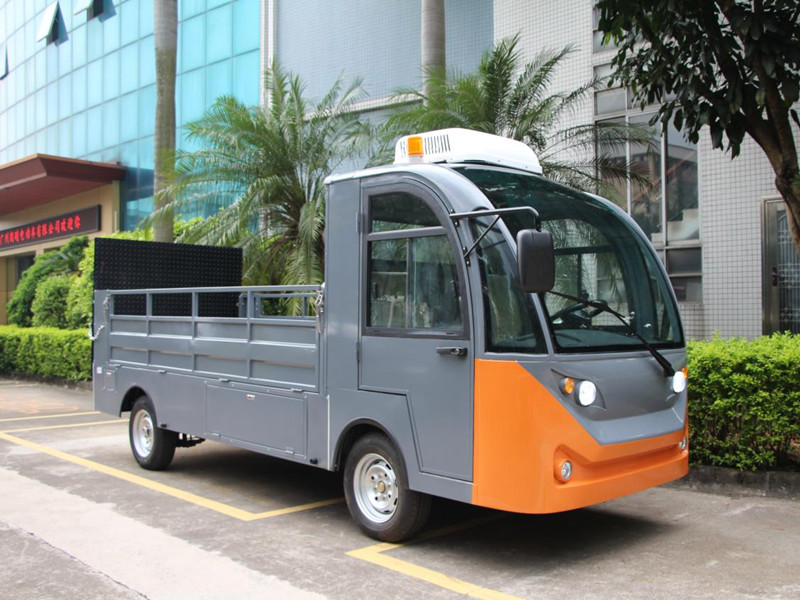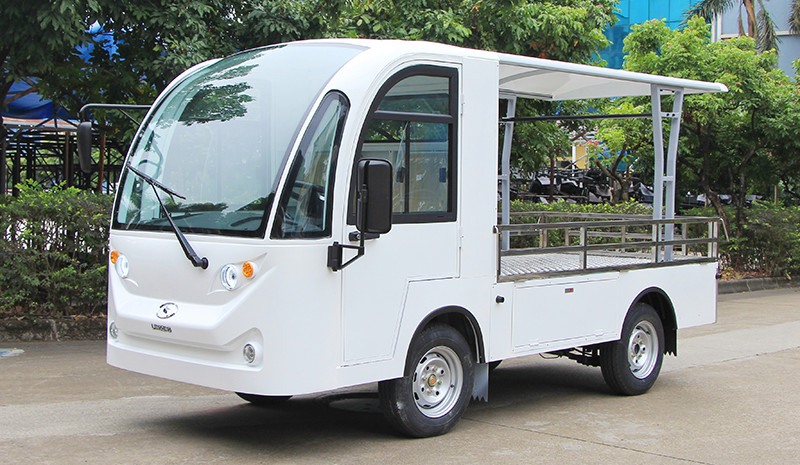Content Menu
● Introduction to Electric Mini Trucks
>> Features of Electric Mini Trucks
● Introduction to Electric Bicycles
>> Features of Electric Bicycles
● Comparison of Electric Mini Trucks and Electric Bicycles
>> Purpose and Capacity
>> Environmental Impact
>> Cost and Maintenance
>> Suitability for Urban Environments
● Benefits of Each Option
>> Benefits of Electric Mini Trucks
>> Benefits of Electric Bicycles
● Challenges and Future Developments
>> Challenges
>> Future Developments
● Extended Analysis: Market Trends and Consumer Preferences
>> Market Trends
>> Consumer Preferences
>> Impact on Urban Planning
● Case Studies: Successful Implementations
>> Electric Mini Trucks in Logistics
>> Electric Bicycles in Commuting
● Conclusion
● FAQ
>> 1. What are the primary advantages of electric mini trucks over traditional vehicles?
>> 2. How do electric bicycles contribute to urban sustainability?
>> 3. What are the key challenges facing the adoption of electric mini trucks and bicycles?
>> 4. How do electric mini trucks and bicycles impact urban planning?
>> 5. What future developments can we expect in electric mini trucks and bicycles?
In recent years, the world has witnessed a significant shift towards eco-friendly transportation options, driven by concerns over climate change and urban congestion. Two popular alternatives gaining traction are electric mini trucks and electric bicycles. Both offer unique advantages for short-distance travel, but they cater to different needs and environments. This article will delve into the comparison of these two modes of transportation, exploring their features, benefits, and suitability for various scenarios.

Introduction to Electric Mini Trucks
Electric mini trucks are compact, versatile vehicles designed for utility and efficiency. They are ideal for businesses and individuals needing to transport goods or equipment in urban areas without the bulk of larger trucks. These vehicles often feature advanced lithium-ion batteries, regenerative braking, and customizable designs to suit specific tasks.
Features of Electric Mini Trucks
- Compact Design: Easy to navigate in tight spaces, making them perfect for urban deliveries and construction sites.
- Customizable: Offers various battery packs and power systems to meet different operational needs.
- Low Maintenance: Requires less maintenance compared to traditional gas or diesel trucks.
- Economical: Charges typically cost under $2 per day, significantly reducing operational expenses.
Example: The Westward MAX-EV electric utility truck is a prime example, offering a rugged chassis, automotive-grade components, and a versatile truck bed. It is designed for efficiency and cost-effectiveness, making it an excellent choice for utility and construction companies.
Introduction to Electric Bicycles
Electric bicycles, or e-bikes, are another eco-friendly option for short distances. They combine the benefits of traditional cycling with the convenience of electric assistance. E-bikes are perfect for commuting, running errands, or enjoying leisure rides.
Features of Electric Bicycles
- Pedal Assistance: Provides electric support for pedaling, making long distances and steep climbs easier.
- Cost-Effective: Low operating costs with minimal maintenance and no fuel expenses.
- Environmentally Friendly: Produces zero emissions, contributing to cleaner air in urban areas.
- Convenient: Often equipped with accessories like baskets and racks for carrying goods.
Example: Mini electric bicycles are particularly popular for their compact size and portability. They are ideal for navigating through crowded city streets and can be easily stored in small spaces.
Comparison of Electric Mini Trucks and Electric Bicycles
Purpose and Capacity
- Electric Mini Trucks: Designed for transporting heavy equipment and goods, making them suitable for businesses and utility tasks. They have a higher payload capacity, typically ranging from 500 to 1500 pounds.
- Electric Bicycles: Primarily used for personal transportation and light cargo, ideal for commuting and running errands. They usually have limited carrying capacity, often restricted to a few hundred pounds.
Environmental Impact
Both options are environmentally friendly, producing zero tailpipe emissions. However, electric mini trucks generally consume more energy due to their larger size and heavier loads.
Cost and Maintenance
- Electric Mini Trucks: While they offer long-term savings through reduced fuel and maintenance costs, the initial purchase price can be higher than that of electric bicycles.
- Electric Bicycles: Generally more affordable upfront, with lower maintenance and operating costs.
Suitability for Urban Environments
- Electric Mini Trucks: Excellent for navigating urban areas due to their compact size and maneuverability, but they still require parking space.
- Electric Bicycles: Ideal for congested city streets, allowing riders to bypass traffic and park easily.

Benefits of Each Option
Benefits of Electric Mini Trucks
1. Versatility: Can be customized to fit various business needs, from construction to delivery services.
2. Payload Capacity: Offers significant carrying capacity, making it suitable for heavy-duty tasks.
3. Economical: Reduces operational costs for businesses.
Benefits of Electric Bicycles
1. Convenience: Easy to park and maneuver in crowded areas.
2. Health Benefits: Provides an opportunity for physical activity while commuting.
3. Cost-Effective: Low initial and ongoing costs.
Challenges and Future Developments
Challenges
- Infrastructure: Both electric mini trucks and bicycles require adequate charging infrastructure and supportive urban planning.
- Regulations: Varying regulations across regions can impact the adoption of these vehicles.
Future Developments
- Technology Advancements: Improvements in battery technology and design will enhance efficiency and range.
- Sustainability: Increased focus on eco-friendly materials and production processes.
Extended Analysis: Market Trends and Consumer Preferences
Market Trends
The market for electric vehicles, including both mini trucks and bicycles, is experiencing rapid growth. This trend is driven by government incentives, environmental concerns, and technological advancements. In many regions, governments are offering subsidies and tax credits to encourage the adoption of electric vehicles, which has significantly boosted sales.
Consumer Preferences
Consumers are increasingly prioritizing sustainability and cost-effectiveness when choosing transportation options. Electric mini trucks appeal to businesses looking to reduce operational costs and environmental impact, while electric bicycles attract individuals seeking a convenient, eco-friendly way to commute.
Impact on Urban Planning
The rise of electric mini trucks and bicycles is influencing urban planning. Cities are investing in bike lanes and electric charging infrastructure to support these vehicles. This shift towards sustainable transportation is also driving innovation in urban design, with a focus on creating more livable and environmentally conscious cities.
Case Studies: Successful Implementations
Electric Mini Trucks in Logistics
Companies like UPS and FedEx have begun integrating electric mini trucks into their fleets for urban deliveries. These vehicles have proven effective in reducing emissions and operational costs while navigating congested city streets.
Electric Bicycles in Commuting
Cities like Copenhagen and Amsterdam have seen a significant increase in e-bike usage for daily commutes. This shift has contributed to cleaner air and reduced traffic congestion, making these cities more livable.
Conclusion
Electric mini trucks and electric bicycles serve different purposes but share a common goal of reducing environmental impact. While electric mini trucks are ideal for utility and business applications, electric bicycles are perfect for personal transportation and short errands. Both options offer significant benefits in terms of cost savings and environmental sustainability. As technology continues to evolve, we can expect these modes of transportation to become even more efficient and accessible.

FAQ
1. What are the primary advantages of electric mini trucks over traditional vehicles?
Electric mini trucks offer reduced maintenance costs, lower operational expenses, and a smaller environmental footprint compared to traditional gas or diesel trucks. They are also highly customizable and maneuverable in urban settings.
2. How do electric bicycles contribute to urban sustainability?
Electric bicycles contribute to urban sustainability by reducing emissions, promoting physical activity, and easing traffic congestion. They are an eco-friendly alternative for short-distance travel, making cities cleaner and more livable.
3. What are the key challenges facing the adoption of electric mini trucks and bicycles?
Key challenges include the need for adequate charging infrastructure, varying regulations across regions, and initial investment costs. However, these challenges are being addressed through technological advancements and supportive policies.
4. How do electric mini trucks and bicycles impact urban planning?
Both vehicles influence urban planning by necessitating the development of charging infrastructure and bike-friendly roads. This leads to more sustainable and livable cities, with a focus on reducing congestion and emissions.
5. What future developments can we expect in electric mini trucks and bicycles?
Future developments will likely include improvements in battery technology, increased use of eco-friendly materials, and enhanced customization options. These advancements will make both electric mini trucks and bicycles more efficient, sustainable, and appealing to consumers.










































